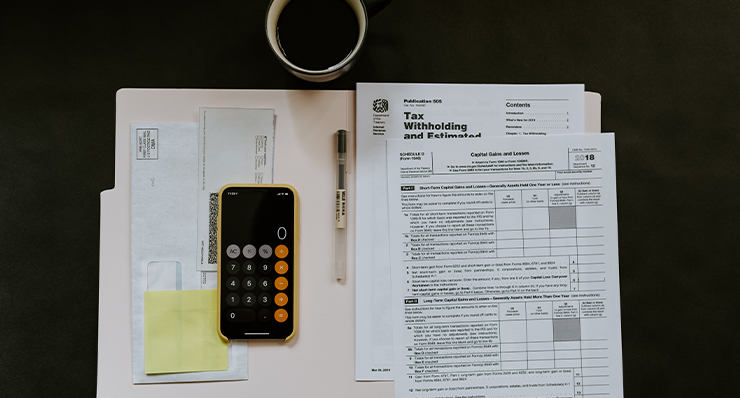
Investing in property can be incredibly lucrative, but there are hurdles to navigate, including learning how to sell rental property without paying taxes. If you’re looking to purchase a property to rent, or you’re thinking of selling a house or condo you’re already renting out, it’s wise to ensure you have an in-depth understanding of how rental real estate taxes work.
While IRS taxation isn’t always the simplest subject matter to digest, there are ways to save money when you sell. Some of the most common ways to sell a rental property without paying taxes are:
● Utilizing a 1031 real estate exchange
● Offsetting property gains with losses
● Converting a rental property into a primary residence
Every investor’s situation is different, so it’s important to understand all of the options available before making a decision. Our comprehensive guide below will provide you with the specific information you need to make the right choice.
Sale of Rental Property Tax Treatment
Buying, renting, and selling real estate is one of the most popular revenue streams for savvy investors. While purchasing and selling properties can generate a substantial income, it is important to be aware of tax obligations and fees that are expected when selling. Tax liability should always be a concern for those looking to buy new rental properties or sell real estate that is used to generate an income.
Taxation is often a complex matter, and selling real estate that is used for rental purposes is no exception. The sale of rental property can expose investors to significant expenses if you’re not aware of charges like capital gains tax and depreciation deductions when you set out as a new investor. Although taxes tend to be convoluted and complicated, there are ways of simplifying the process of paying taxes on rental properties and figuring out ways to reduce your tax burden.
Many ambitious investors plan to generate profits, both through rental income and the sale of real estate. To achieve this, it’s crucial to be aware of methods that can be employed to sell rental property without paying taxes. This guide will take you through sale of rental property tax processes, offering information about steps you can take to avoid taxes on the sale and increase your profits. If you’re new to investing, or you have questions about the sale of rental property tax treatment, it’s wise to consult a financial planner or certified public accountant who can help you sell your property in the most tax-efficient way possible.
How Much Tax Do You Pay When You Sell a Rental Property?
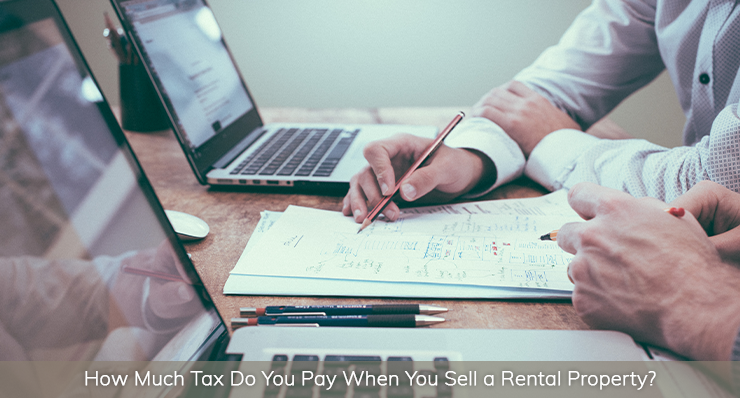
The most significant sum you need to consider when you sell a rental property is capital gains tax, also known as CGT. Capital gains tax is a charge you pay when your rental property sells for a profit. The amount of tax you pay will depend on three main factors:
● Your income bracket
● The number of years you’ve owned the property you wish to sell
● The methods you plan to use to minimize tax payments when you find a buyer
There are two forms of capital gains tax: short-term capital gains and long-term capital gains. Long-term capital gains tax is applicable to investors and property owners who purchased the property in question more than a year before selling. Capital gains tax is charged at a rate of 15% when you have an individual taxable income under $434,550 and at 20% for incomes over $434,551 in 2019. To use an example, if the purchase price of your house was $200,000 and it sold for $300,000, you would be liable to pay $15,000 in capital gains tax at a rate of 15%.
On the surface, it seems relatively straightforward to deduce how much tax you’ll pay when you sell a rental property, but there are all kinds of avenues you can pursue to reduce the amount of tax you pay and even avoid paying capital gains tax on a sale.
How Do I Report the Sale of Rental Property on my Taxes?
If your rental property is up for sale, and you found a buyer and the transaction closes, it’s essential to notify the Internal Revenue Service (IRS). You will need to report the sale of a rental property during the relevant tax year. Before you approach this task, it’s beneficial to seek professional advice to simplify the process and ensure you’re providing accurate information and you get the numbers right. The task of filing a tax return when you own or sell rental real estate can be tricky without expert knowledge and experience.
The IRS views rental properties in a similar way to business real estate, and as such, it’s not possible to add gains and losses incurred through the sale of your property to your 1040 form. Instead, the IRS asks investors and real estate proprietors to complete a separate form, IRS Form 4797. This document deals with sales of business property, and it is available via the IRS website. Rental homes are classed as Section 1250 properties.
If you’ve owned the home for more than one year, you will be required to complete different parts of the form that are related to the building and the land. If the property was sold for a profit, the sale of the building goes in a separate part than that of the land. If the property was sold at a loss, the structure is included in the same part of the form as the land. The IRS provides detailed information and instructions online to help you complete the form, but it is a good idea to seek advice if you have questions or concerns.
Once you have successfully completed form 1497, the next step is Schedule D, which covers capital gains profits and losses. The numbers recorded in your forms will then be added to your IRS Form 1040 to establish how much tax you owe in total for the specified tax year.
How Do You Calculate Capital Gains on a Rental Property?
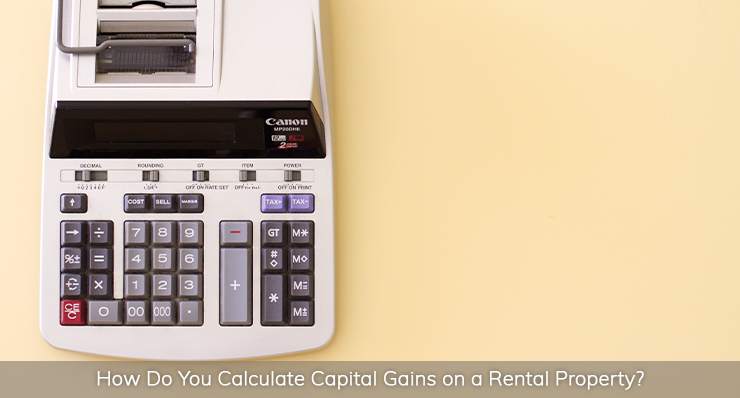
If you own a rental property, you may be liable to pay capital gains tax. The rate at which you calculate capital gains tax will depend on how long you’ve owned the property. If you purchased the property less than a year before you sold it, you’ll be liable for short-term capital gains tax. If you’ve owned the property for over a year, you’ll be liable to pay long-term capital gains tax. For short-term capital gains, you’ll be charged at the same rate as income tax. This means that the amount of tax you pay will be dependent on your income and the tax bracket in which you fall.
For long-term capital gains, tax will be charged at 0%, 15% or 20%. Your income will dictate how much tax you pay. The latest rates for 2019 are as follows:
● Income $0-$39,375: 0%
● Income $39,376-$434,550: 15%
● Income over $434,551: 20%
For joint applications for married couples, the rates are as follows:
● Income $0-$78,750: 0%
● Income: $78,751-$488,850: 15%
● Income over $488,851: 20%
In the majority of cases, investors own rental properties for at least a year before selling, and this means that long-term capital gains tax applies to most sellers. If you haven’t owned your property for longer than 12 months, it’s worth calculating your predicted tax payment in advance, as you could save a substantial amount of money by waiting for the 12-month marker to pass. This will be dependent on your income and, subsequently, the rate of income tax you pay. Often long-term capital gains tax rates are lower than standard income tax rates.
Capital gains tax applies to the profit you make on your rental property. You will pay the relevant rate, which is 15% in most cases, on the profit. This is the numerical difference between the purchase price and the price at which you sell.
How to Avoid Paying Capital Gains Tax on Rental Property
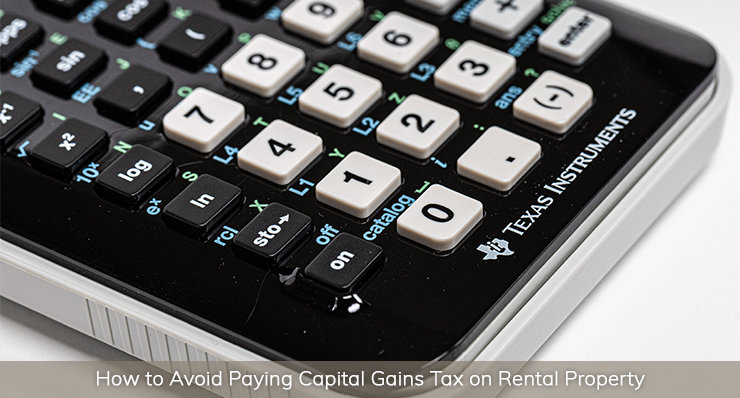
Every real estate investor wants to make as much as possible from buying, selling, and renting properties. If you sell a rental property, you stand to lose a substantial amount of money by paying capital gains tax, especially if you’re in the high earner tax bracket. You could be hit with a tax bill that could put a 20% dent in your profits.
For those looking to reduce the tax burden and sell rental properties without paying tax, there are methods you can employ to avoid paying capital gains tax when you sell your property. There are 3 main options:
1. 1031 Real Estate Exchange
One popular option for real estate investors is to reinvest the profits generated by the sale of one rental property to fund another acquisition. A 1031 real estate exchange enables you to roll the proceeds of one sale into a similar investment opportunity. If you choose to pursue this avenue, you’ll negotiate the terms of the sale of your rental property, and ownership will then be transferred to an appointed intermediary. The intermediary will then sell the property, receive the payment and hold it on your behalf until you have identified a suitable property to buy and you’re ready to complete the purchase. The intermediary will then release the funds and oversee the purchase for you. The 1031 exchange enables you to buy new rental properties without paying capital gains or depreciation recapture taxes. These fees will be deferred until you sell a rental property without investing in another. This is an excellent option for investors who are looking to expand their real estate portfolio, as a 1031 exchange may be used on any number of properties.
Before you consider a 1031 real estate exchange for your rental property, it’s crucial to understand the qualifying criteria and stipulations. This type of exchange can only be used under certain circumstances, and there are rules governing its use. These are outlined below:
● Properties involved in a 1031 real estate exchange must be used for investment or business purposes only.
● The new property must be classified as ‘of like kind.’ ● An approved, independent intermediary must be appointed. You cannot act as an intermediary for yourself.
● Once your property is sold, you have 45 days to identify new properties and the exchange must be completed within 180 days.
● You must clearly state your intentions in writing when identifying new properties, providing details of the property, which should be submitted to and signed by your intermediary or the owner of the house you plan to purchase. You can identify up to three properties, or any number of properties, provided that the total market value doesn’t exceed 200% of the fee for which you sold your property.
● Any funds that are left over from the sale of your property and not used to fund a new purchase are liable for taxation, so it’s best to search for a property of equal or higher value.
It is important to note that the term ‘of like kind’ is relatively loose when talking about real estate. If you’re selling a condo, for example, you don’t have to buy a new condo, and you could easily swap a townhome for a house. Timing is crucial with this option. You have 45 days after closing the sale of your property to identify potential new properties in writing, and you must close within 180 days. If the tax year is due to end before the 180-day period elapses, you’ll need to push for a rapid exchange. If you miss the deadline, you’ll be liable to pay capital gains tax on the rental property you sold.
The terms of a 1031 exchange are laid out under IRS Section 1031.
2. Offsetting property gains with losses
Also known as tax loss harvesting, this option can be beneficial for anyone who has capital losses within the same tax year. If you’ve generated a profit on your rental property, and you choose to sell, you can offset this profit against losses you may have incurred through alternative investments. This is a technique that is often used by investors who profit from stocks and shares, but it can also be useful for real estate investment. The arrangement works because the IRS enables you to pair profits and losses to calculate the total amount of tax you owe. To illustrate this concept, imagine you made a profit on a rental property, but you lost more money on stocks within the tax year. In this scenario, you could offset the profits against the loss, reducing the amount of tax you owe.
3. Using your rental property as a primary residence
Another tactic that can be used to reduce taxes on the sale of a rental property is using your rental home as a primary residence. When you sell a home as a homeowner, the tax liabilities are much less substantial than selling a rental property for profit. This means that it can be beneficial to convert a rental property into a primary residence before you sell. IRS Section 121 states that you can exclude up to $250,000 from the profit of primary residence property sales if you are single, and $500,000 if you are married and have owned the property for at least 5 years. To qualify, you must have lived in the residence for a minimum of 2 years. The amount you can deduct will depend on how long you’ve owned the property, and how long you’ve used it as your primary residence. If you bought a house for $200,000 and rented it out for 3 years before living in it for 2 years, for example, you could deduct 40% of the capital gains tax incurred on the profit. If the house sold for $300,000, for example, this means that you would be liable to pay capital gains tax on $60,000, rather than $100,000.
Selling Rental Property at a Loss
Every investor aims to make a profit when buying and selling real estate, but sometimes, life throws us curveballs, and things don’t go as planned. If you find yourself in a situation where you need to sell, and the value of the property has decreased, or you’re forced to take a lower offer, the news might not be all bad. It is possible to claim deductions when selling an investment property at a loss. This is not a viable option when selling a primary residence at a loss.
To determine the extent of a loss on a property, you’ll need to work out the cost basis. This sum relates to the purchase price plus improvements you made and minus depreciation that you claimed as tax deductions during the period in which you owned the property. If the sale price is lower than the cost basis, this creates a deductible loss, which could reduce the amount of tax you owe. You can use the loss to offset capital gains on other investments up to $3,000, and any remainder can be carried forward to the next tax year until the total loss has been offset.
It’s important to make sure you calculate the cost basis carefully. Often, when swapping properties through the 1031 real estate exchange, the cost basis can be lower than anticipated.
It may also be possible to offset a loss if you bought a property as a primary residence and then its market value fell after you converted it into a rental property. In this case, the cost basis would be the lowest figure when comparing the purchase price and the market value at the time when the property was converted into a rental home. If the value dropped after you changed the use and turned the property into a rental home, you could claim a deductible loss. This would not be the case if the value dropped before conversion to a rental residence.
How Does Depreciation Work on a Rental Property?
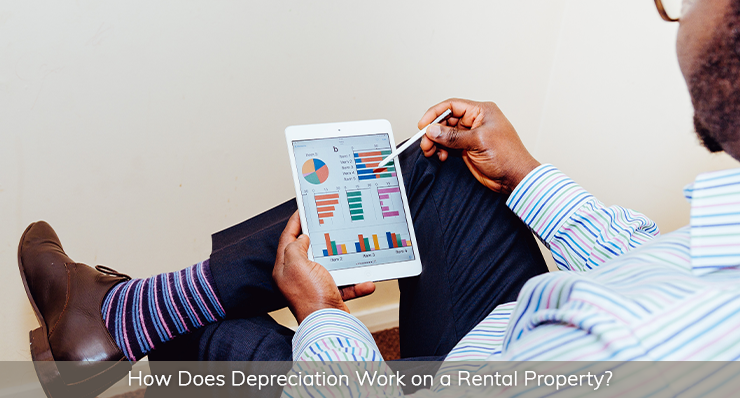
If you’re thinking of buying a rental property, it’s incredibly beneficial to learn all about depreciation and how it works when you own a rental home. Depreciation can have a significant impact on your tax liability. In simple terms, depreciation is a type of expense, which is used to deduct the cost of household improvements incurred by real estate investors. The IRS uses depreciation methods to enable rental property owners to recoup some of the costs of enhancing their investment and modifying the property. Depreciation is perhaps the most substantial tax saving available to rental property owners, and it can help to lower your taxable income every year.
The method used for rental properties in the U.S. is known as MACRS (modified accelerated cost recovery system). This system sets out a process of recovering capital costs based on annual deductions that are provided in line with specified timeframes, referred to as ‘useful life.’ The most common MACRS system used by property owners is the general depreciation system, or GDS.
Rental property depreciation is calculated according to useful life terms, which are stipulated by the IRS. These terms are:
● 27.5 years for residential properties
● 39 years for commercial real estate
These terms begin at the point of service. This means the date on which you rent the property, rather than the date of purchase. The timeframe ends when the property is taken out of service, for example, when a lease ends and is not renewed. There are certain criteria in place for depreciation, and you can’t claim every cost. You can offset the cost of major improvements and repairs, but general wear and tear is not covered, for example.
To calculate depreciation, you’ll need to factor in the cost basis of your asset and the depreciation rate. If you were to spend $10,000 on a new kitchen, with a useful life of 10 years, for example, this would enable you to deduct $1,000 over a 10-year period. The depreciation expense for a rental property owner is calculated based on the value of the building, which is subtracted from the total purchase price, taking away the land value. If a house is purchased for $200,000, for example, and the building value is $125,000, the depreciation expense will work out at 125,000 divided by 27.5 (the useful life term). The expense is then multiplied by the marginal tax rate to give an annual saving. In this case, the individual would save $1,000 to $2,000 in tax per year as a result of depreciation.
What Happens to Depreciation When Selling a Rental Property?
When you sell a rental property, you may be liable for capital gains tax, but you might also have to consider additional fees in the form of depreciation recapture. If you’ve claimed deductible expenses while you owned the property, you will be liable to pay a 25% federal recapture tax on the depreciation value. This means that if you purchased a property for $300,000 and it sold for $500,000, and you claimed $100,000 in depreciation deductions during your ownership, you would be liable for 25% recapture tax on the $100,000 as well as capital gains tax on the $200,000 profit.
To avoid paying depreciation recapture taxes and capital gains, property investors often take advantage of exchange opportunities and invest profits into another rental property. A real estate 1031 exchange enables investors to continue adding to their portfolio without paying tax on every acquisition.
If you’re toying with the idea of selling your rental property, it’s advisable to ensure you understand exactly what kinds of fees you’ll be liable for in terms of taxes that can be applied to rental properties. If you want to sell and buy another property, it’s wise to research the terms of the 1031 real estate exchange, as this enables you to save on capital gains and depreciation expenses. To benefit from this strategy, you’ll need to identify suitable properties within 45 days of selling your property and complete the purchase within 180 days.
Selling Rental Property to Buy Primary Residence
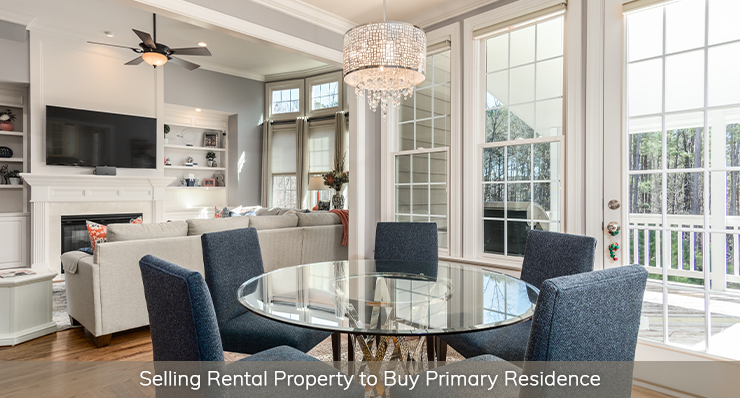
Many real estate owners and investors sell property to fund another purchase. If you’re thinking of selling and buying another property, it’s important to distinguish between rental and investment properties and homes that will become a primary residence. Often, investors look to save money on taxes by taking part in an exchange, but this is only viable when buying investment properties, not primary residences. If you plan to sell a rental property and buy a house to use as a home, you will not be able to take advantage of the 1031 real estate exchange.
One way you could save money on taxes when buying a primary residence and selling a rental property is to live in the rental house for a period of at least two years. If you have owned a house for 5 years, for example, and you’ve lived in it as a primary residence for two years, you can benefit from IRS rules that enable you to exclude primary residence capital gains from your tax return liability. You can apply for exclusions as a single person or as a married couple. In this case, you’ll pay significantly less tax than you would if you were to sell the rental property and then buy a primary residence.
If you’re not in a hurry to sell your rental property, or you’re thinking about investing in another rental home in the future, it’s worth weighing all the options and considering timing before you make a decision. If you can hang onto your rental property and live in it before you sell, or you can invest in another rental property now, you could save a substantial amount in tax payments.
Need Help Selling Your Rental Property?
Investing in rental properties is an excellent way to boost your income and enhance the value of your estate, but it’s not always easy to manage a portfolio or navigate complicated taxation rules. This is where Landmark Real Estate Sales and Vacation Rentals excels. Based in the spectacular mountains of Western North Carolina, we specialize in selling mountain homes and vacation rentals. Boasting a diverse property portfolio that includes everything from vacant land and mountain cabins to chic condos, commercial real estate and luxury homes, we have many years of experience helping sellers to get the best price for their properties. We understand the ins and outs of buying and selling real estate in North Carolina, and we’re here to make the process of purchasing and selling rental properties as simple and stress-free as possible.
Landmark Realty Group was established as an affiliation of real estate agents and brokers and, over the years, we have evolved and grown into a strong, insightful, experienced team. We prioritize our clients’ needs, and we know the local area like the backs of our hands. We appreciate the beauty and charisma of this region, and we’re ideally placed to showcase your property and entice buyers.
If you’re looking to sell your rental property, we’re confident we can provide a service that will exceed your expectations. We’re passionate about what we do, we’re huge fans of the area in which we live, and we have the experience and knowledge to help you reap the rewards of your rental property sale.
Whether you’re selling your first rental property, or you have a portfolio you want to expand, our expert team is on hand to eliminate stress and facilitate a quick and easy sale. We provide cutting-edge marketing services. If you have any questions about selling rental properties, or you’re searching for a real estate company you can trust to deliver incredible results, get in touch with us today. Call our friendly team at 888.743.0510 or email us at info@landmarkrg.com.
Posted by Landmark Concierge on
Leave A Comment